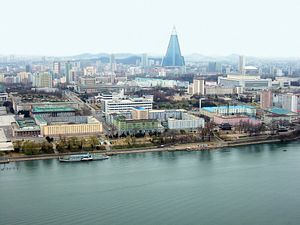One of North Korea’s top foreign policy hands, and a close adviser to leader Kim Jong-un, died in a car crash on Tuesday, according to state news agency KCNA. Kim Yang-gon, 73, was a secretary in the Korean Workers’ Party and the head of the party’s United Front Department, which is responsible for managing relations with South Korea.
Kim was described as the “closest comrade and a solid revolutionary partner” of Kim Jong-un. KCNA said the leader would preside over a state funeral for Kim Yang-gon on Thursday (interestingly, former regime number two, Choe Ryong-hae, will be on the funeral committee as well, apparently marking the end of his time in “reeducation”).
Kim, who was seen as a proponent of talks with Seoul, became North Korea’s top official on inter-Korean affairs under the late Kim Jong-il, after being named head of the United Front Department in 2007. He helped organize a rare summit meeting between Kim Jong-il and South Korea’s then-president, Roh Moo-hyun, that same year, according to Yonhap News. More recently, Kim was one of two senior North Korean officials who attended the talks that defused inter-Korean tensions in August of this year. He also visited South Korea to attend the closing ceremony of the 2014 Asian Games in Incheon.
Inter-Korea relations saw a brief period of optimism in late 2015, with family reunions and high-level talks taking place. But there was little progress on more substantial steps, including a possible meeting between South Korean President Park Geun-hye and Kim Jong-un. Now Kim Yang-gon’s death will likely put the brakes on whatever progress was being made. As Kim was one of the most experienced officials handling inter-Korean affairs for the North, South Korean experts believe Pyongyang may be hesitant to make further overtures in the short term.
A spokesperson for South Korea’s Unification Ministry, Jeong Joon-hee, said Seoul had offered its condolences to the North over Kim’s death, and noted that he “contributed to a meaningful agreement at the August talks.” However, Jeong declined to speculate on how Kim’s passing would affect inter-Korea relations.
Meanwhile, Kim was also active in North Korea’s foreign policy more broadly, meaning his sudden death may also impact Pyongyang’s relations with other states. In particular, China-North Korea relations may be affected. Ties between the two neighbors have seen their share of ups and downs in 2015, with Chinese Politburo Standing Committee member Liu Yunshan’s visit to Pyongyang in October marking a high point. This month, though, the two couldn’t even pull off a goodwill musical performance by North Korean groups in Beijing.
Chinese Foreign Ministry spokesperson Lu Kang praised Kim for his role in the bilateral relationship, saying he had “long been committed to developing China-DPRK relations.” Kim “in particular, made active contributions to high level exchanges between both sides and parties,” Lu added, saying China would “deeply mourn the passing of Comrade Kim Yang-gon.”
As with inter-Korea relations, Kim’s death is unlikely to permanently alter China policy, but may affect Pyongyang’s approach in the short-term as it reshuffles responsibilities. But ultimately Kim’s passing means one less seasoned foreign policy hand shaping policy in Pyongyang, which has to be concerning to Beijing. China already saw one of the main handlers of the bilateral relationship, Jang Song-thaek, purged and executed back in December 2013.
































